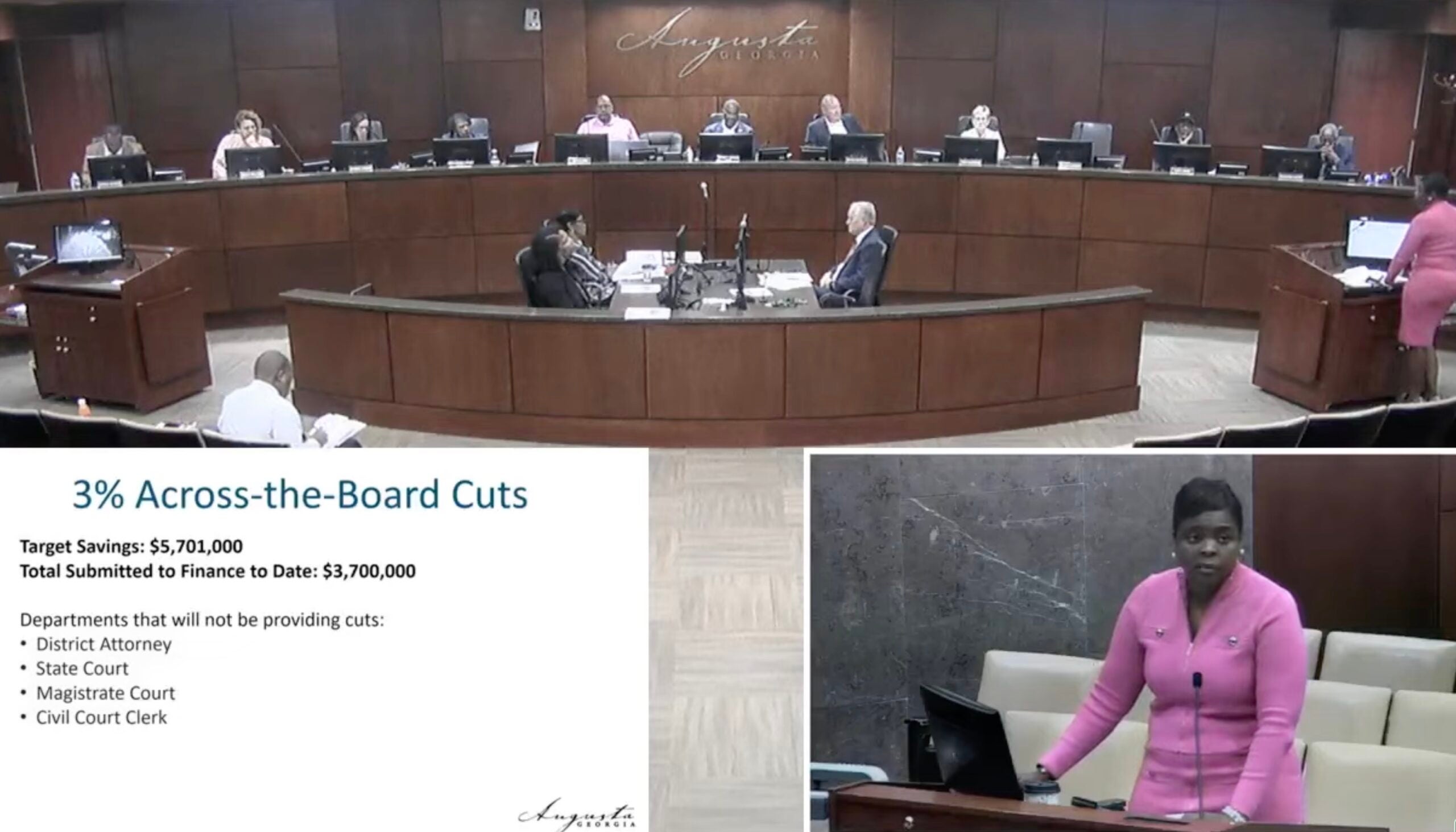Five years of using pandemic relief funds to balance the budget while also not raising taxes leaves many Augustans destined to feel some sort of pain from the 2026 budget.
The Augusta Commission heard more bad news about the city’s projected $21 million 2026 budget shortfall and how to address it from Administrator Tameka Allen during a Thursday work session.
The good news? Fire tax collections grew from $19 million to $22 million, removing the need for a fire millage increase. Increased hotel-motel taxes will bring in an additional $1.3 million, which Allen said could fund recreation improvements.
With the end of American Rescue Plan Act funds next year, the general fund deficit is $11.6 million, while law enforcement faces a $9.53 million gap after adding $13.49 million in new spending, she said.
Allen said ARPA dollars were used to fill annual budget gaps, not to create new positions. Of the nearly $85 million total, $22 million replaced lost revenue, $11.5 million funded pay supplements including raising the city’s minimum wage to $15/hour, $6 million offset health insurance costs, $3.8 million covered streetlight deficits and $2.7 million subsidized transit.
“These issues should be familiar to you,” Allen said. “We’ve had them for a number of years — we’ve just had the funds to offset these issues.”
Added 2026 Expenses
- $5 million – employee health insurance
- $2.6 million – sheriff’s office salaries and added personnel
- $1.5 million – prisoner expenses
- $1 million – additional judicial, district attorney, and public defender staff after the state added a new judge
- $3 million – cost-of-living adjustment (COLA)
“I truly believe we need to consistently start building in a COLA to our base budget if we want to attract and retain innovative and hardworking employees,” Allen said.
Allen’s budget proposal
- Two-mill tax increase – raises $16 million
- 3% across-the-board budget cuts – saves $5.7 million
- “Rightsizing” Housing and Community Development and the Richmond County Correctional Institution – combined $1.5 million
- Higher employee health premiums and deductibles – $590,000
- Cuts to non-governmental organizations – $873,940
- Augusta Transit reduction – $1 million, cutting three routes and Saturday service
The plan would raise $25.7 million, creating a $4.5 million surplus after covering the deficit, she said.
Without the tax hike, departments would need to cut 8.42% across the board. Excluding elected officials’ offices, reductions would reach 22.86%, Allen said.
A two-mill increase equals $70 a year for a $100,000 home or $150 for a $200,000 home. School taxes comprise an additional two-thirds of most tax bills.
Augusta is currently $41 million below its tax cap; the increase would still leave the city 2.8 mills below the cap.
Some departments, including the district attorney, state court, civil and magistrate courts and civil court clerk, said they can’t make any cuts.
Mayor Garnett Johnson asked what happens when departments refuse. Interim General Counsel Jim Plunkett said the city “has an obligation to adequately fund the court system,” which cannot be eliminated or self-funded.
Contracts and Outside Funding
According to Allen’s presentation, Augusta holds $706,000 in multi-year contracts with outside groups, such as $50,000 annually for Augusta Arsenal Soccer Club, which also receives field maintenance.
A 15% reduction to four authorities — the Augusta Canal, Land Bank, Development Authority, and Downtown Development Authority — would cut spending from $751,230 to $676,110.
Mandated funding such as the Augusta Regional Library, DFCS, and CSRA Regional Commission totals $4.2 million; a 15% reduction would bring it to $3.8 million.
Allen proposed a 30% reduction to remaining external agencies, which range from the Greater Augusta Arts Council to Serenity Behavioral Health. These receive a total of $1.4 million. A 50% cut would lower that to $995,980.
Commissioner Don Clark questioned whether some agencies duplicate city services and if the city measures their return on investment.
Commissioner Jordan Johnson questioned cutting entities such as Child Enrichment and Augusta City Enterprises, which handles downtown cleanup. “I will never support a budget that supports cutting ACE,” he said. Johnson also suggested renegotiating costly vendor contracts.
Commissioner Catherine Smith McKnight said while the city’s budget picture looks bad, she will not support a tax increase.
The commission will continue budget discussions Monday at 9 a.m., including utility rate increases, the new grounds maintenance department, and Richmond County Correctional Institution.











